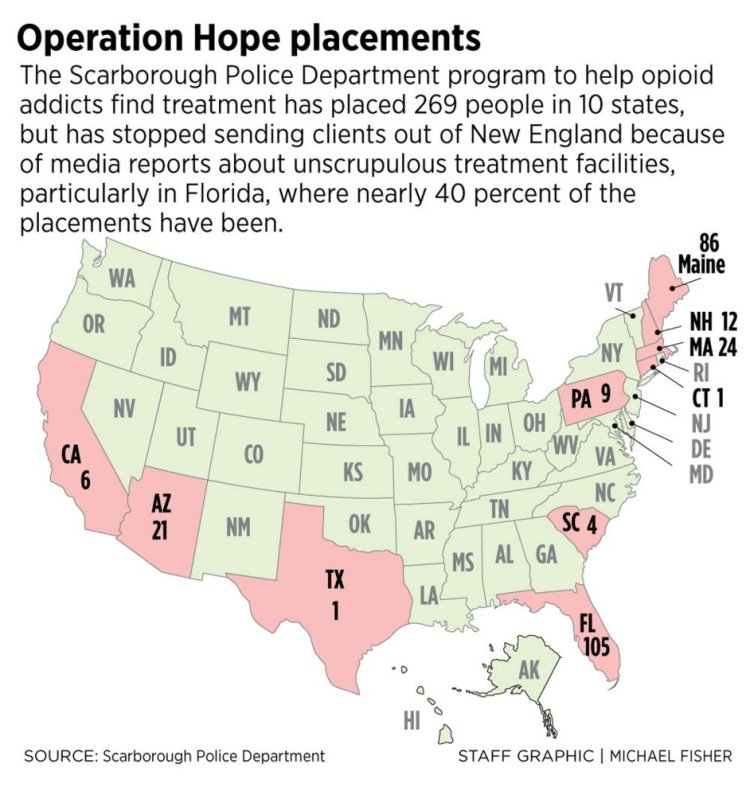The Scarborough Police Department’s Operation Hope has stopped sending clients out of New England for treatment for opioid addiction, largely because of concerns about unscrupulous programs, especially in Florida.
Launched in 2015, Operation Hope was conceived as a way for police to channel addicts who sought help into a treatment program as an alternative to criminal prosecution on drug-related charges. But with few treatment beds available in Maine to meet the state’s skyrocketing demand, many of the program’s placements were out of state.
Of the 269 clients Operation Hope has placed, 183 have been in other states, including 105 in Florida.
Chief Robert Moulton said the department was troubled by news reports earlier this year of questionable practices at some treatment centers, so they decided to discontinue placements outside New England, even though they had not heard any major “horror stories” involving Operation Hope clients.
“We read about some scams that were going on and we didn’t want to take a chance and be a part of that,” Moulton said. “These places were far enough away that you couldn’t really know what was going on.”
He said one Operation Hope client told Scarborough Police that his insurance company had apparently been overbilled by a Florida center, but his own finances were not affected. Another client complained about substandard facilities at a Florida center. Moulton was not aware of any other complaints.
A story published in May by STAT, a health journalism website that partners with The Boston Globe, detailed apparent insurance scams and referrals to Florida clinics where patients were receiving little or no treatment.
“They get down there, and it’s nothing more than a puppy mill for insurance billing,” Eric Spofford, founder and CEO of Granite Recovery Centers in New Hampshire told STAT. “There’s no investment in helping them get better.”
RELYING ON OUT-OF-STATE FACILITIES

Scarborough Police Chief Robert Moulton, right, and Officer John Gill coordinate Operation Hope, a lifeline for opioid addicts in Maine. Staff photo by Derek Davis
Operation Hope, which was inspired by a similar program in Gloucester, Massachusetts, was one of the early high-profile efforts in Maine to approach addiction as a disease rather than a moral failing that demanded punishment. More than one Maine resident a day dies of a drug overdose, and there were 376 overdose deaths, an all-time high, in 2016.
In most cases, getting help from Operation Hope meant flying out of state – to Florida or one of eight other states – because Maine lacked treatment opportunities. In the program’s first six months, four out of five Operation Hope participants headed out of Maine, mostly to clinics in Florida, Arizona and Massachusetts.
“We always wanted to help people closer to home, but we really had no other choice. That was the only way to get people help,” said Steve Cotreau, program manager at Portland Community Recovery Center. The nonprofit social support center for people in recovery has helped with Operation Hope placements.
In recent months, Operation Hope has received more funding, and now most clients are being sent to Maine, New Hampshire or Massachusetts, and none out of New England.
Scarborough police declined a request by the Press Herald for a list of treatment centers where clients are placed.
Moulton said Operation Hope was meant to be a transitional program until Maine came up with a better system. But the state has largely failed to expand treatment options enough to meet the demand.
“Operation Hope is not the answer,” Moulton said. “Maine needs a comprehensive answer, and this is not it.”
APPLICATION FOR FEDERAL GRANT
The program now has more resources and is partially paying for treatment beds, instead of relying on centers to offer free beds for the uninsured. Moulton said the program received a $50,000 grant from the Maine Attorney General’s Office, plus other donations, and has $30,000 on hand to help pay for treatment.
The free beds that were available at the program’s outset mostly have dried up, Cotreau said.
Scarborough has applied to the U.S. Department of Justice for a $300,000 grant to hire an additional person to run the program and to provide more money for treatment. Moulton said the grant would enable the program to track outcomes for its clients when they return from Operation Hope-coordinated treatment. He said the department will learn in October whether it received the grant.
The program also currently does not have the funding to pay for medication-assisted treatment, which health experts consider the most effective treatment for opioid addiction. It combines behavioral health counseling with medications that help curb cravings, resulting in the best track record for avoiding relapses.
Cotreau said Operation Hope never had the financial resources for medication-assisted treatment, which includes Suboxone and methadone.
“Until there’s treatment expansion, this was better than nothing,” Cotreau said.
Joe Lawlor can be contacted at 791-6376 or at:
jlawlor@pressherald.com
Twitter: joelawlorph
Copy the Story LinkSend questions/comments to the editors.





Success. Please wait for the page to reload. If the page does not reload within 5 seconds, please refresh the page.
Enter your email and password to access comments.
Hi, to comment on stories you must . This profile is in addition to your subscription and website login.
Already have a commenting profile? .
Invalid username/password.
Please check your email to confirm and complete your registration.
Only subscribers are eligible to post comments. Please subscribe or login first for digital access. Here’s why.
Use the form below to reset your password. When you've submitted your account email, we will send an email with a reset code.